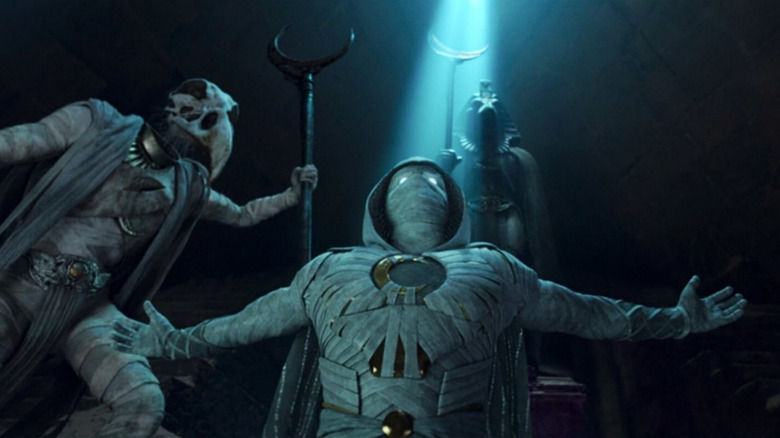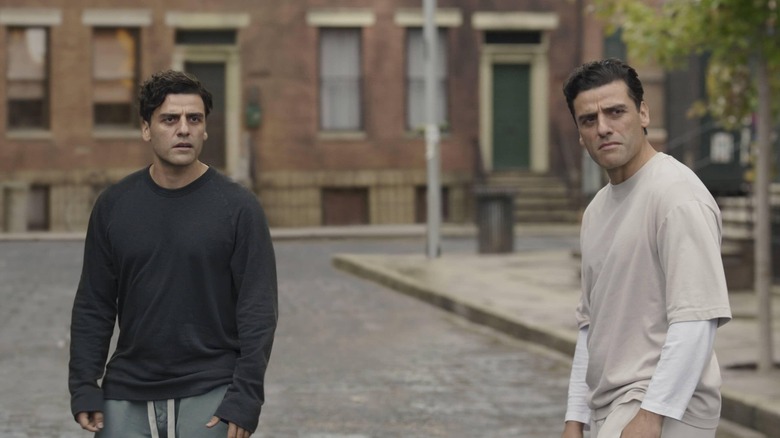
This post contains spoilers for the latest episode of "Moon Knight."
Here's something that may be somewhat surprising to realize: Even though we're now many years into the ongoing superhero boom, with caped crusaders and their equally as powerful foes battling it out both on-screen and in multiplexes (and TV screens!) across the globe, some of the biggest and most highly-budgeted superhero media still suffer from many of the same problems as they did decades ago. For every blockbuster that gets it right and justifies further stories set in their world, it's still a frightfully common occurrence to receive thinly-veiled IP schlock that seem abjectly embarrassed of their own source material.
Perhaps one of the biggest issues to plague this corner of pop culture involves the seemingly obsessive need to painstakingly chart all the minutiae of traditional superhero origin stories -- no matter how familiar we are with the basics by now. To be clear, there's nothing inherently wrong with origins done well, but Marvel's "Moon Knight" has thankfully steered well clear of potentially thorny issues by instead dropping viewers right into the disorienting headspace of Oscar Isaac's Steven Grant as he struggles to eke out a normal, unspectacular life in the face of the intrusive presence of Marc Spector. But where previous episodes have leveraged Steven's (and, by extension, our own) confusion about his and Marc's true backstory to great effect, keeping us in the dark so that moments like last week's major plot twist would land all the harder, the latest episode (titled "Asylum") finally makes good on the potential of flipping all those origin tropes on their head in the early going.
Here, we're given a natural and perfectly-timed exploration into the traumatic events that factored into both Steven and Marc's distinct experiences ... in the penultimate hour of the series. And even more impressively, director Mohamed Diab and credited writers Rebecca Kirsch and Matthew Orton throw one more curveball at us. In an episode that's all about painful confrontations of the past, we actually get two origin stories: one for Marc Spector and his blood oath to Khonshu that turned him into Moon Knight, and one for Steven Grant's very existence. Both personalities, appropriately enough, are given equal weight.
Balancing The Scales

In an early sign of how much the status quo has shifted beneath our feet, "Asylum" takes only a few minutes to confirm that, yes, Marc and Steven getting shot by Arthur Harrow (Ethan Hawke) really did happen and encountering the Egyptian goddess Tawaret isn't just their imagination. Waking up to find themselves in one unique version of the Egyptian afterlife, Marc and Steven must race against the clock to open up to one another and find balance in their hearts before being welcomed to paradise. Little do they know how impossible that will be to achieve when they're fractured, literally and otherwise, between multiple personalities. That's where both of their origin stories factor in, although with one crucial difference from traditional superhero origins -- in this case, the suit and powers are utterly beside the point.
Until now, we'd only seen the barest hints of the trauma lurking beneath the surface, mostly conveyed through the strength of Oscar Isaac's performance. That dramatically changes once the early portions of the episode walk us through Marc's childhood, beginning with the accidental death of his younger brother Randall that Marc's abusive mother lays entirely at his own feet. Structurally, the script uses Steven's need to discover everything Marc has kept from him as our gateway to learning why only Marc remembers these traumas.
Though a major change from the comics, intertwining child abuse with Marc's creation of the Steven Grant persona rings true from both modern medical diagnoses of dissociative identity disorder and a narrative perspective. One very much leads to the other, as Marc's lingering pain throughout adulthood directly feeds into the steps he takes that ultimately turns him into the murderous tool of Khonshu. Only once we finally see how Moon Knight came into being does the episode purposefully transition (with some gaslighting by "Doctor Harrow" in between, naturally) to the first moment that a young Marc calls upon Steven to shield him from his tortured reality. In the process, "Moon Knight" serves as a shining example of how upending conventional modes of superhero storytelling can better serve a character.
With only one episode left, "Moon Knight" must prove if it can overcome another major superhero pitfall, arguably even trickier than origin stories -- whether it can properly stick the landing.
Read this next: Every Pre-MCU Marvel Movie Ranked
The post How Moon Knight Episode 5 Gets Around the Superhero Origin Story Problem appeared first on /Film.
0 Comments